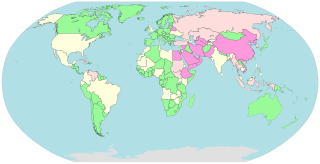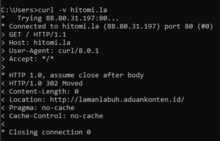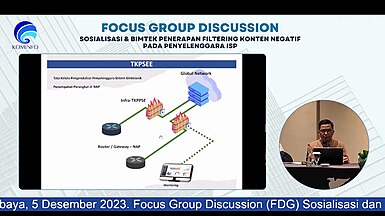An Internet filter is software that restricts or controls the content an Internet user is capable to access, especially when utilized to restrict material delivered over the Internet via the Web, Email, or other means. Content-control software determines what content will be available or be blocked.
The Great Firewall is the combination of legislative actions and technologies enforced by the People's Republic of China to regulate the Internet domestically. Its role in internet censorship in China is to block access to selected foreign websites and to slow down cross-border internet traffic. The Great Firewall operates by checking transmission control protocol (TCP) packets for keywords or sensitive words. If the keywords or sensitive words appear in the TCP packets, access will be closed. If one link is closed, more links from the same machine will be blocked by the Great Firewall. The effect includes: limiting access to foreign information sources, blocking foreign internet tools and mobile apps, and requiring foreign companies to adapt to domestic regulations.
Internet censorship in Australia is enforced by both the country's criminal law as well as voluntarily enacted by internet service providers. The Australian Communications and Media Authority (ACMA) has the power to enforce content restrictions on Internet content hosted within Australia, and maintain a blocklist of overseas websites which is then provided for use in filtering software. The restrictions focus primarily on child pornography, sexual violence, and other illegal activities, compiled as a result of a consumer complaints process.

Internet censorship in Pakistan is government control of information sent and received using the Internet in Pakistan. There have been significant instances of website access restriction in Pakistan, most notably when YouTube was banned from 2012 to 2016. Pakistan has asked a number of social media organisations to set up local offices within the country, but this is yet to happen.

Internet censorship in India is done by both central and state governments. DNS filtering and educating service users in suggested usages is an active strategy and government policy to regulate and block access to Internet content on a large scale. Measures for removing content at the request of content creators through court orders have also become more common in recent years. Initiating a mass surveillance government project like Golden Shield Project is an alternative that has been discussed over the years by government bodies.

Internet censorship is the legal control or suppression of what can be accessed, published, or viewed on the Internet. Censorship is most often applied to specific internet domains but exceptionally may extend to all Internet resources located outside the jurisdiction of the censoring state. Internet censorship may also put restrictions on what information can be made internet accessible. Organizations providing internet access – such as schools and libraries – may choose to preclude access to material that they consider undesirable, offensive, age-inappropriate or even illegal, and regard this as ethical behavior rather than censorship. Individuals and organizations may engage in self-censorship of material they publish, for moral, religious, or business reasons, to conform to societal norms, political views, due to intimidation, or out of fear of legal or other consequences.

Iran is notable for the degree of internet censorship imposed by its government. Iran was in second place in the world for internet censorship in 2022 after repeatedly shutting off the internet in parts of the country and blocking access to social media platforms to curb protests stemming from Mahsa Amini's death, a new poll showed. The country now targets virtual private networks (VPNs) in order to completely cut people off from accessing outside media. Several popular social media platforms and instant messaging applications are blocked by the Iranian government and the Islamic Revolutionary Guard Corps (IRGC), including YouTube, Facebook, Twitter, WhatsApp, Telegram, Snapchat, Reddit, Medium, Instagram, and Threads. Some streaming services, including Netflix and Hulu, are also blocked by the government. Websites relating to health, science, sports, news, pornography, and shopping are also routinely blocked.
Internet censorship in the United Kingdom is conducted under a variety of laws, judicial processes, administrative regulations and voluntary arrangements. It is achieved by blocking access to sites as well as the use of laws that criminalise publication or possession of certain types of material. These include English defamation law, the Copyright law of the United Kingdom, regulations against incitement to terrorism and child pornography.
Censorship in Denmark has been prohibited since 1849 by the Constitution:
§ 77: Any person shall be at liberty to publish his ideas in print, in writing, and in speech, subject to his being held responsible in a court of law. Censorship and other preventive measures shall never again be introduced.
DNS hijacking, DNS poisoning, or DNS redirection is the practice of subverting the resolution of Domain Name System (DNS) queries. This can be achieved by malware that overrides a computer's TCP/IP configuration to point at a rogue DNS server under the control of an attacker, or through modifying the behaviour of a trusted DNS server so that it does not comply with internet standards.

The Federal Service for Supervision of Communications, Information Technology and Mass Media, abbreviated as Roskomnadzor (RKN), is the Russian federal executive agency responsible for monitoring, controlling and censoring Russian mass media. Its areas of responsibility include electronic media, mass communications, information technology and telecommunications, supervising compliance with the law, protecting the confidentiality of personal data being processed, and organizing the work of the radio-frequency service.
Internet censorship in Ireland is a controversial issue with the introduction of a graduated response policy in 2008 followed by an effort to block certain file sharing sites starting in February 2009. Beyond these issues there are no government restrictions on access to the Internet or credible reports that the government monitored e-mail or Internet chat rooms. Individuals and groups could engage in the expression of views via the Internet, including by e-mail. Irish law provides for freedom of speech including for members of the press, and the government generally respects these rights in practice. An independent press, an effective judiciary, and a functioning democratic political system act jointly to ensure freedom of speech and of the press.
Internet censorship circumvention, also referred to as going over the wall or scientific browsing in China, is the use of various methods and tools to bypass internet censorship.
The precise number of websites blocked in the United Kingdom is unknown. Blocking techniques vary from one Internet service provider (ISP) to another with some sites or specific URLs blocked by some ISPs and not others. Websites and services are blocked using a combination of data feeds from private content-control technology companies, government agencies, NGOs, court orders in conjunction with the service administrators who may or may not have the power to unblock, additionally block, appeal or recategorise blocked content.
The child abuse image content list is a list of URLs and image hashes provided by the Internet Watch Foundation to its partners to enable the blocking of child pornography & criminally obscene adult content in the UK and by major international technology companies.
GitHub has been the target of censorship from governments using methods ranging from local Internet service provider blocks, intermediary blocking using methods such as DNS hijacking and man-in-the-middle attacks, and denial-of-service attacks on GitHub's servers from countries including China, India, Iraq, Russia, and Turkey. In all of these cases, GitHub has been eventually unblocked after backlash from users and technology businesses or compliance from GitHub.

The Ministry of Communications and Informatics is an Indonesian government ministry that is responsible for communications, information affairs and internet censorship. The ministry reports to the president and is currently led by Budi Arie Setiadi, the Minister of Communications and Informatics.

This list of Internet censorship and surveillance in Europe provides information on the types and levels of Internet censorship and surveillance that is occurring in countries in Europe.

This list of Internet censorship and surveillance in Asia provides information on the types and levels of Internet censorship and surveillance that is occurring in countries in Asia








